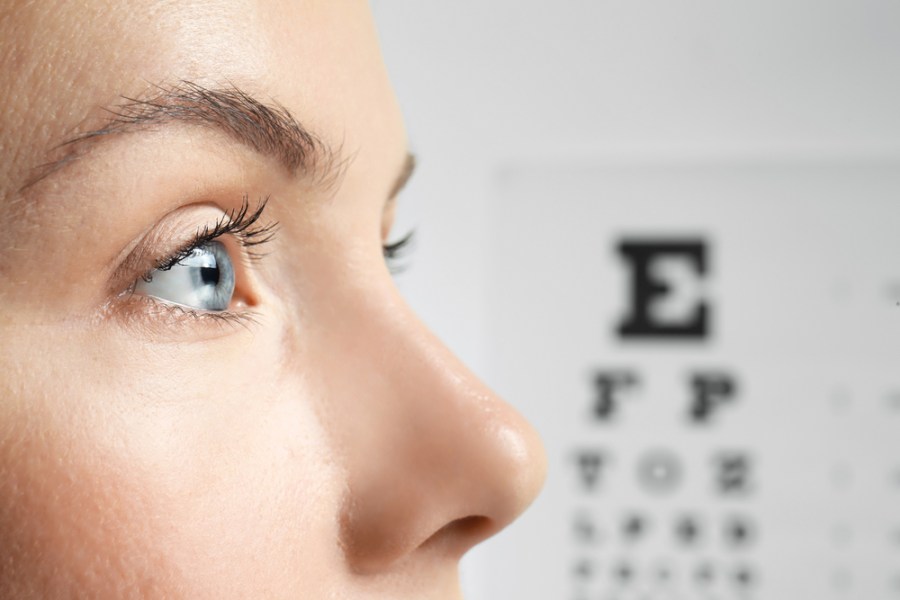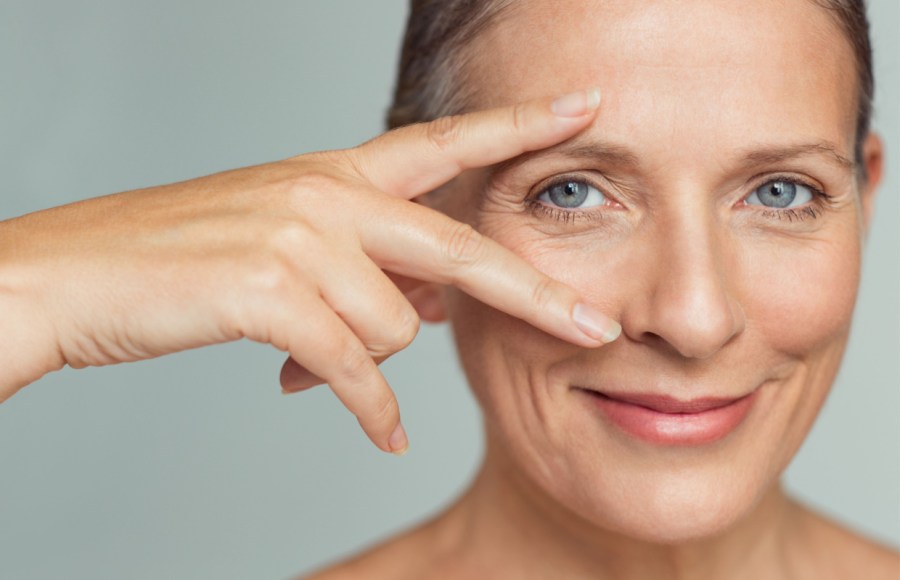Learn how to improve your eye health with our nutrition tips, including the best foods and natural remedies to protect your peepers…
Whether you previously worked in an office, a gym or were a stay-at-home mum – everyone has become au fait with Zoom, Facetime and/or Microsoft Teams to connect with colleagues, as more of us now work from home. Increasingly poor vision, headaches and migraines became the upshot of lockdown restrictions for many, with some experts believing that increased screen time coupled with being more sedentary has definitely made our collective eyesight worse.
A study published by the University of Hong Kong linked COVID-19 restrictions and increased screen time to higher levels of short sightedness in children, too. In addition, a poll by Fight for Sight found that 38 per cent of adults in the UK who used screens in lockdown thought their eyesight had been affected, leading to migraines and difficulty reading.
Of the respondents who said their sight had deteriorated, 39 per cent said they now had difficulty reading, with 23 per cent reporting headaches/ migraines and 17 per cent believing their night vision had deteriorated.
The importance of eye health
‘Your eyesight is of huge importance. Not only does vision allow you to make sense of the world around you, function and interact with that world, but your eyes also allow you to set the circadian rhythm of all cells of your body,’ says functional nutritionist, and our keto expert, Pauline Cox, author of Primal Living in a Modern World (Primal Research Publication, £24.95).
‘Specialised receptor cells within the retina communicate with the brain, regulating your sleep patterns, levels of feel-good hormone dopamine and even impacting blood sugar levels and metabolism,’ adds Pauline.
Healthy eyes require a healthy cardiovascular system, as the cells of the eyes are very metabolically active. ‘This high demand for energy means they need a steady stream of nutrients and fuel for optimal vision,’ she says.
Here are some of those important nutrients for well-functioning eyes…

Not only does vision allow you to make sense of the world around you, function and interact with that world, but your eyes also allow you to set the circadian rhythm of all cells of your body
Best foods and natural remedies to improve eye health
LUTEIN
Lutein is a powerful antioxidant that supports healthy vision. With its anti-inflammatory properties, lutein has been shown to protect against free-radical damage in the eye, helping to preserve the integrity of the cells. Studies show lutein can help prevent cataracts and macular degeneration, both of which are leading causes of age-related vision decline.
‘Lutein has been shown to offset the detrimental effects of age-related macular degeneration in moderate to severe cases. The effect was not significantly observed in mild age-related macular degeneration, though,’ says Pauline.
FIND IT IN… dark green leafy veg such as spinach, Swiss chard and kale, plus squash, pumpkin, peas, broccoli, eggs, carrots and sweet potato.
Research suggests lutein is more effective in combination with another antioxidant, zeaxanthin, found in peppers and carrots. Eaten together, studies show they lower age-related macular degeneration incidence.
ASTAXANTHIN
Astaxanthin has been shown in research to increase the ocular blood flow to the eyes, as well as increasing the antioxidant enzyme profile of the eyes, an important indicator of the level of protection the eyes have from damaging free radicals.
‘Free radicals are atoms without an electron. They are more unstable and so seek out other atoms or molecules to bond to. This is called oxidative stress and can lead to a number of degenerative diseases, and causes the symptoms of ageing,’ says Pauline.
Antioxidants such as astaxanthin and lutein neutralise free radicals by giving them some of their own electrons, thereby preventing free radicals from damaging the structure of the body’s tissues. That is why antioxidant products and foods are beneficial. Astaxanthin has also been shown to improve skin moisture and elasticity, which could be as a result of improved blood flow to the skin.
FIND IT IN… seafood, especially prawns, shrimp and salmon. Astaxanthin is what gives these foods their pink colour when cooked, for example prawns and shrimp. The fish are this colour because of their diet, which is why high-dose astaxanthin supplements are often derived from the microalgae or krill which the fish eat.
OMEGA-7
Your eyelids lubricate the delicate surface of your eyes when you blink. Intense focus and screen-based work often mean you blink less often and as a result, eyes can quickly become dry, red and suffer from a burning sensation.
This special fatty acid helps to lubricate mucosal membranes such as those that line the eyelids and also the mouth, vagina and urethra. Research and anecdotal reports of the benefits of omega-7 for alleviating dry eyes and other areas of internal dryness is showing promise for those living with the discomfort of dry eyes.
‘A diet rich in eye-supporting nutrients – vitamin A, zinc, beta-carotenes, vitamin E, vitamin C and healthy fats – is key for maintaining the health of your eyes. Certain supplements may help to increase the concentration of key nutrients that have research-based results in protecting and improving conditions of the eye, namely age-related macular degeneration and dry eyes, as well as supporting the healthy functioning of the eye,’ says Pauline.
FIND IT IN… sea buckthorn oil (the richest source), anchovies, salmon, olive oil, and macadamia nut oil. Also try Wiley’s Finest Bold Vision (£35.99), which is rich in lutein, omega-7, astaxanthin, zeaxanthin, zinc, bilberry and vitamin E.

Being outdoors is shown to help reduce the onset of myopia and potentially the degree or rate of its progression.
3 tips to improve eye health
Dr Paramdeep Bilkhu MCOptom, clinical adviser at the College of Optometrists, shares some quick tips on how to improve your eye health today.
- Go outside. Being outdoors is really important, not only for general health but it is shown to help reduce the onset of myopia and potentially the degree or rate of its progression.
- Like any muscle in the body, eye muscles that control movement and focus will become fatigued. Therefore, ensure your computer is optimally positioned and take regular breaks.
- Try the 20/20/20 rule – this is where you look into the distance (around 20 feet away) every 20 minutes for 20 seconds, and blink regularly to keep the eyes comfortable at all times.
Get your eyes tested
The charity Fight for Sight recommends having your eyes tested every two years, even if you think your vision is fine. Alongside changes in eyesight, an eye test can spot some eye conditions, as well as other illnesses and clotting.
Words: Alison Hardinge | Images: Shutterstock








